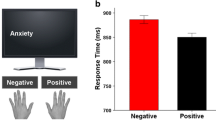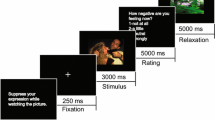Abstract
How emotion and cognition interact is still a matter of debate. Investigation of this interaction in terms of the brain oscillatory dynamics appears to be an essential approach. To investigate this topic, we designed two separate three-stimulus oddball tasks, including emotional stimuli with different valences. Twenty healthy young subjects were included in the study. They completed two tasks, namely: the positive emotional oddball task and the negative emotional oddball task. Each task included the target, non-target, and distractor stimuli. Positive and negative pictures were the target stimuli in the positive and negative emotional oddball task. We asked participants to determine the number of target stimuli in each task. During sessions, EEGs were recorded with 32 electrodes. We found that (negative) target stimuli elicit higher delta (1–3.5 Hz) and theta (4–7 Hz) power responses but not the phase-locking responses compared to (positive) distractor stimuli during the negative oddball task. On the other hand, the same effect was not seen during the positive emotional oddball task. Here, we showed that the valence dimension interacted with the target status. Finally, we summarized our results that the presence of negative distractors attenuated the target effect of the positive stimuli due to the negative bias.







Similar content being viewed by others
Availability of data and material
The data of this study are available on request from the corresponding author.
References
Aftanas LI, Varlamov AA, Pavlov SV, Makhnev VP, Reva NV (2001a) Affective picture processing: event-related synchronization within individually defined human theta band is modulated by valence dimension. Neurosci Lett 303(2):115–118. https://doi.org/10.1016/S0304-3940(01)01703-7
Aftanas LI, Varlamov AA, Pavlov SV, Makhnev VP, Reva NV (2001b) Event-related synchronization and desynchronization during affective processing: Emergence of valence-related time-dependent hemispheric asymmetries in theta and upper alpha band. Int J Neurosci 110(3–4):197–219. https://doi.org/10.3109/00207450108986547
Aftanas LI, Reva NV, Varlamov AA, Pavlov SV, Makhnev VP (2004) Analysis of evoked EEG synchronization and desynchronization in conditions of emotional activation in humans: temporal and topographic characteristics. Neuroscience 34(8):859–867. https://doi.org/10.1023/B:NEAB.0000038139.39812.eb
Alekseichuk I, Turi Z, De Lara GA, Antal A, Paulus W (2016) Spatial working memory in humans depends on theta and high gamma synchronization in the prefrontal cortex. Curr Biol 26(12):1513–1521. https://doi.org/10.1016/j.cub.2016.04.035
Atagün MI, Güntekin B, Özerdem A, Tülay E, Başar E (2013) Decrease of theta response in euthymic bipolar patients during an oddball paradigm. Cogn Neurodyn 7(3):213–223. https://doi.org/10.1007/s11571-012-9228-7
Balconi M, Brambilla E, Falbo L (2009) Appetitive vs. defensive responses to emotional cues. Autonomic measures and brain oscillation modulation. Brain Res 1296:72–84. https://doi.org/10.1016/j.brainres.2009.08.056
Barbey AK, Colom R, Paul EJ, Grafman J (2014) Architecture of fluid intelligence and working memory revealed by lesion mapping. Brain Struct Funct 219(2):485–494. https://doi.org/10.1007/s00429-013-0512-z
Başar-Eroğlu C, Başar E, Demiralp T, Schürmann M (1992) P300-response: possible psychophysiological correlates in delta and theta frequency channels: a review. Int J Psychophysiol 13:161–179. https://doi.org/10.1016/0167-8760(92)90055-g
Başar-Eroğlu C, Demiralp T, Schürmann M, Başar E (2001) Topological distribution of oddball ‘ P300 ’ responses. Int J Psychophysiol 39:213–220. https://doi.org/10.1016/S0167-8760(00)00142-2
Bernat E, Bunce S, Shevrin H (2001) Event-related brain potentials differentiate positive and negative mood adjectives during both supraliminal and subliminal visual processing. Int J Psychophysiol 42(1):11–34. https://doi.org/10.1016/s0167-8760(01)00133-7
Bradley MM, Lang PJ (1994) Measuring emotion: the self-assessment manikin and the semantic differential. J Behav Ther Exp Psychiatry 25(1):49–59. https://doi.org/10.1016/0005-7916(94)90063-9
Bradley MM, Codispoti M, Cuthbert BN, Lang PJ, Bradley MM, Codispoti M, Bruce N (2001) Emotion and motivation I: defensive and appetitive reactions in picture processing. Emotion 1(3):276–298. https://doi.org/10.1037//1528-3542.1.3.276
Briggs KE, Martin FH (2008) Target processing is facilitated by motivationally relevant cues. Biol Psychol 78(1):29–42. https://doi.org/10.1016/j.biopsycho.2007.12.007
Carretie L, Mercado F, Tapia M, Hinojosa JA (2001) Emotion, attention, and the ‘negativity bias’, studied through event-related potentials. Int J Psychophysiol 41:75–85. https://doi.org/10.1016/S0167-8760(00)00195-1
Carretié L, Hinojosa JA, Albert J, Mercado F (2006) Neural response to sustained affective visual stimulation using an indirect task. Exp Brain Res 174(4):630–637. https://doi.org/10.1007/s00221-006-0510-y
Chien JH, Colloca L, Korzeniewska A, Cheng JJ, Campbell CM, Hillis AE, Lenz FA (2017) Oscillatory EEG activity induced by conditioning stimuli during fear conditioning reflects salience and valence of these stimuli more than expectancy. Neuroscience 346:81–93. https://doi.org/10.1016/j.neuroscience.2016.12.047
Csukly G, Farkas K, Marosi C, Szabó Á (2016) Deficits in low beta desynchronization reflect impaired emotional processing in schizophrenia. Schizophr 171(1–3):207–214. https://doi.org/10.1016/j.schres.2016.01.031
Cuthbert BN, Schupp HT, Bradley MM, Lang P (2000) Brain potentials in affective picture processing: covariation with autonomic arousal and affective report. Biol Psychol 52(1):95–111. https://doi.org/10.1016/S0301-0511(99)00044-7
de Cesarei A, Codispoti M (2011) Affective modulation of the LPP and α-ERD during picture viewing. Psychophysiology 48(10):1397–1404. https://doi.org/10.1111/j.1469-8986.2011.01204.x
Delplanque S, Lavoie ME, Hot P, Silvert L, Sequeira H (2004) Modulation of cognitive processing by emotional valence studied through event-related potentials in humans. Neurosci Lett 356:1–4. https://doi.org/10.1016/j.neulet.2003.10.014
Delplanque S, Silvert L, Hot P, Rigoulot S, Sequeira H (2006) Arousal and valence effects on event-related P3a and P3b during emotional categorization. Int J Psychophysiol 60(3):315–322. https://doi.org/10.1016/j.ijpsycho.2005.06.006
Demiralp T, Ademoglu A, Istefanopulos Y, Başar-Eroglu C, Başar E (2001) Wavelet analysis of oddball P300. Int J Psychophysiol 39(2–3):221–227. https://doi.org/10.1016/S0167-8760(00)00143-4
Duncan S, Barrett LF (2007) Affect is a form of cognition: A neurobiological analysis. Cogn Emot 21(6):1184–1211. https://doi.org/10.1080/02699930701437931
Ergen M, Marbach S, Brand A, Başar-Eroǧlu C, Demiralp T (2008a) P3 and delta band responses in visual oddball paradigm in schizophrenia. Neurosci Lett 440(3):304–308. https://doi.org/10.1016/j.neulet.2008.05.054
Ergen M, Marbach S, Brand A, Başar-Eroğlu C, Demiralp T (2008b) P3 and delta band responses in visual oddball paradigm in schizophrenia. Neurosci Lett 440(3):304–308. https://doi.org/10.1016/j.neulet.2008.05.054
Feng C, Wang L, Liu C, Zhu X, Dai R, Mai X, Luo YJ (2012) The time course of the influence of valence and arousal on the implicit processing of affective pictures. PLoS ONE 7(1):1–9. https://doi.org/10.1371/journal.pone.0029668
Franken IHA, Muris P, Nijs I, van Strien JW (2008) Processing of pleasant information can be as fast and strong as unpleasant information: implications for the negativity bias. NEJP 64:168–176. https://doi.org/10.1007/BF03076419
Güntekin B, Başar E (2010) Event-related beta oscillations are affected by emotional eliciting stimuli. Neurosci Lett 483(3):173–178. https://doi.org/10.1016/j.neulet.2010.08.002
Güntekin B, Başar E (2014) A review of brain oscillations in perception of faces and emotional pictures. Neuropsychologia 58(1):33–51. https://doi.org/10.1016/j.neuropsychologia.2014.03.014
Güntekin B, Saatçi E, Yener G (2008) Decrease of evoked delta, theta and alpha coherences in Alzheimer patients during a visual oddball paradigm. Brain Res 1235:109–116. https://doi.org/10.1016/j.brainres.2008.06.028
Güntekin B, Femir B, Gölbaşı BT, Tülay E, Başar E (2017) Affective pictures processing is reflected by an increased long-distance EEG connectivity. Cogn Neurodyn 11(4):355–367. https://doi.org/10.1007/s11571-017-9439-z
Güntekin B, Aktürk T, Yıldırım E, Yılmaz NH, Hanoğlu L, Yener G (2020a) Abnormalities in auditory and visual cognitive processes are differentiated with theta responses in patients with Parkinson’s disease with and without dementia. Int J Psychophysiol 153:65–79. https://doi.org/10.1016/j.ijpsycho.2020.04.016
Güntekin B, Uzunlar H, Çalışoğlu P, Eroğlu-Ada F, Yıldırım E, Aktürk T, Atay E, Ceran Ö (2020b) Theta and alpha oscillatory responses differentiate between six-to seven-year-old children and adults during successful visual and auditory memory encoding. Brain Res 1747:147042. https://doi.org/10.1016/j.brainres.2020.147042
Harper J, Malone SM, Iacono WG (2017) Theta-band delta-band EEG network dynamics during a novelty oddball task. Psychophysiology 54(11):1590–1605. https://doi.org/10.1111/psyp.12906
Herrmann CS, Grigutsch M, Busch N (2005) EEG oscillations and wavelet analysis. In: Handy T (ed) Event related potentials: a methods handbook. MIT Press, Cambridge, pp 229–259
Herrmann CS, Rach S, Vosskuhl J, Strüber D (2014) Time-frequency analysis of event-related potentials: a brief tutorial. Brain Topogr 27(4):438–450. https://doi.org/10.1007/s10548-013-0327-5
Huang YX, Luo YJ (2006) Temporal course of emotional negativity bias: an ERP study. Neurosci Lett 398(1–2):91–96. https://doi.org/10.1016/j.neulet.2005.12.074
Ito TA, Larsen JT, Smith NK, Cacioppo JT (1998) Negative information weighs more heavily on the brain: the negativity bias in evaluative categorizations. J Pers Soc Psychol 75(4):887–900. https://doi.org/10.1037/0022-3514.75.4.887
Jensen O, Tesche CD (2002) Frontal theta activity in humans increases with memory load in a working memory task. Eur J Neurosci 15(8):1395–1399. https://doi.org/10.1046/j.1460-9568.2002.01975.x
Keil A, Bradley MM, Hauk O, Rockstroh B, Elbert T, Lang PJ (2002) Large-scale neural correlates of affective picture processing. Psychophysiology 39(5):641–649. https://doi.org/10.1111/1469-8986.3950641
Klados MA, Frantzidis C, Vivas AB, Papadelis C, Lithari C, Pappas C, Bamidis PD (2009) A framework combining delta event-related oscillations (EROs) and synchronisation effects (ERD/ERS) to study emotional processing. Comput Intell Neurosci. https://doi.org/10.1155/2009/549419
Knyazev GG, Slobodskoj-Plusnin JY, Bocharov AV (2009) Event-related delta and theta synchronization during explicit and implicit emotion processing. Neuroscience 164(4):1588–1600. https://doi.org/10.1016/j.neuroscience.2009.09.057
Kolev V, Yordanova J (1997) Analysis of phase-locking is informative for studying event-related EEG activity. Biol Cybern 76(3):229–235. https://doi.org/10.1007/s004220050335
Kurt P, Eroğlu K, Kuzgun TB, Güntekin B (2017) The modulation of delta responses in the interaction of brightness and emotion. Int J Psychophysiol 112:1–8. https://doi.org/10.1016/j.ijpsycho.2016.11.013
Olofsson JK, Nordin S, Sequeira H, Polich J (2008) Affective picture processing: an integrative review of ERP findings. Biol Psychol 77(3):247–265. https://doi.org/10.1016/j.biopsycho.2007.11.006
Polich J (2007) Updating P300: an integrative theory of P3a and P3b. Clin Neurophysiol 118(10):2128–2148. https://doi.org/10.1016/j.clinph.2007.04.019
Reinhart RM, Nguyen JA (2019) Working memory revived in older adults by synchronizing rhythmic brain circuits. Nat Neurosci 22(5):820–827. https://doi.org/10.1038/s41593-019-0371-x
Rozenkrants B, Polich J (2008) Affective ERP processing in a visual oddball task: arousal, valence, and gender. Clin Neurophysiol 119(10):2260–2265. https://doi.org/10.1016/j.clinph.2008.07.213
Schubring D, Schupp HT (2019) Affective picture processing: alpha- and lower beta-band desynchronization reflects emotional arousal. Psychophysiology 56(8):1–13. https://doi.org/10.1111/psyp.13386
Schupp HT, Cuthbert BN, Bradley MM, Cacioppo JT, Tiffany I, Lang PJ (2000) Affective picture processing: the late positive potential is modulated by motivational relevance. Psychophysiology 37(2):257–261. https://doi.org/10.1017/S0048577200001530
Schupp HT, Markus J, Weike AI, Hamm AO (2003) Emotional facilitation of sensory processing in the visual cortex. Psychol Sci 14(1):7–13. https://doi.org/10.1111/1467-9280.01411
Schupp HT, Stockburger J, Codispoti M, Junghöfer M, Weike AI, Hamm AO (2007) Selective visual attention to emotion. J Neurosci 27(5):1082–1089. https://doi.org/10.1523/JNEUROSCI.3223-06.2007
Schupp HT, Schmälzle R, Flaisch T (2014) Explicit semantic stimulus categorization interferes with implicit emotion processing. Soc Cogn Affect Neurosci 9(11):1738–1745. https://doi.org/10.1093/scan/nst171
Smith NK, Cacioppo JT, Larsen JT, Chartrand TL (2003) May I have your attention, please: electrocortical responses to positive and negative stimuli. Neuropsychologia 41(2):171–183. https://doi.org/10.1016/S0028-3932(02)00147-1
Solomon B, Decicco JM, Dennis TA (2012) Emotional picture processing in children: an ERP study. Dev Cogn Neurosci 2(1):110–119. https://doi.org/10.1016/j.dcn.2011.04.002
Sun J, Sun B, Wang B, Gong H (2012) The processing bias for threatening cues revealed by event-related potential and event-related oscillation analyses. Neuroscience 203:91–98. https://doi.org/10.1016/j.neuroscience.2011.12.038
Weinberg A, Hilgard J, Bartholow BD, Hajcak G (2012) Emotional targets: evaluative categorization as a function of context and content. Int J Psychophysiol 84(2):149–154. https://doi.org/10.1016/j.ijpsycho.2012.01.023
Weinreich A, Stephani T, Schubert T (2016) Emotion effects within frontal alpha oscillation in a picture oddball paradigm. Int J Psychophysiol 110:200–206. https://doi.org/10.1016/j.ijpsycho.2016.07.517
Zhang W, Lu J, Liu X, Fang H, Li H, Wang D, Shen J (2013) Event-related synchronization of delta and beta oscillations reflects developmental changes in the processing of affective pictures during adolescence. Int J Psychophysiol 90(3):334–340. https://doi.org/10.1016/j.ijpsycho.2013.10.005
Author information
Authors and Affiliations
Contributions
BG, TA initiated and planned the study and designed the protocol. BB, BG, TA wrote, reviewed, and edited the paper. TA, HA, YD, CG, ŞK recorded, and BB analyzed the data. BG supervised and controlled the study. All authors contributed to the manuscript revision, read and approved the submitted version.
Corresponding author
Additional information
Publisher's Note
Springer Nature remains neutral with regard to jurisdictional claims in published maps and institutional affiliations.
Editors: Benjamin Straube (University of Marburg), Adrian Wroblewski (University of Marburg); Reviewers: Matthias F. J. Sperl (University of Giessen) and a second researcher who prefers to remain anonymous.
Supplementary Information
Below is the link to the electronic supplementary material.
Rights and permissions
Springer Nature or its licensor (e.g. a society or other partner) holds exclusive rights to this article under a publishing agreement with the author(s) or other rightsholder(s); author self-archiving of the accepted manuscript version of this article is solely governed by the terms of such publishing agreement and applicable law.
About this article
Cite this article
Bölükbaş, B., Aktürk, T., Ardalı, H. et al. Event-related delta and theta responses may reflect the valence discrimination in the emotional oddball task. Cogn Process 24, 595–608 (2023). https://doi.org/10.1007/s10339-023-01158-w
Received:
Accepted:
Published:
Issue Date:
DOI: https://doi.org/10.1007/s10339-023-01158-w




